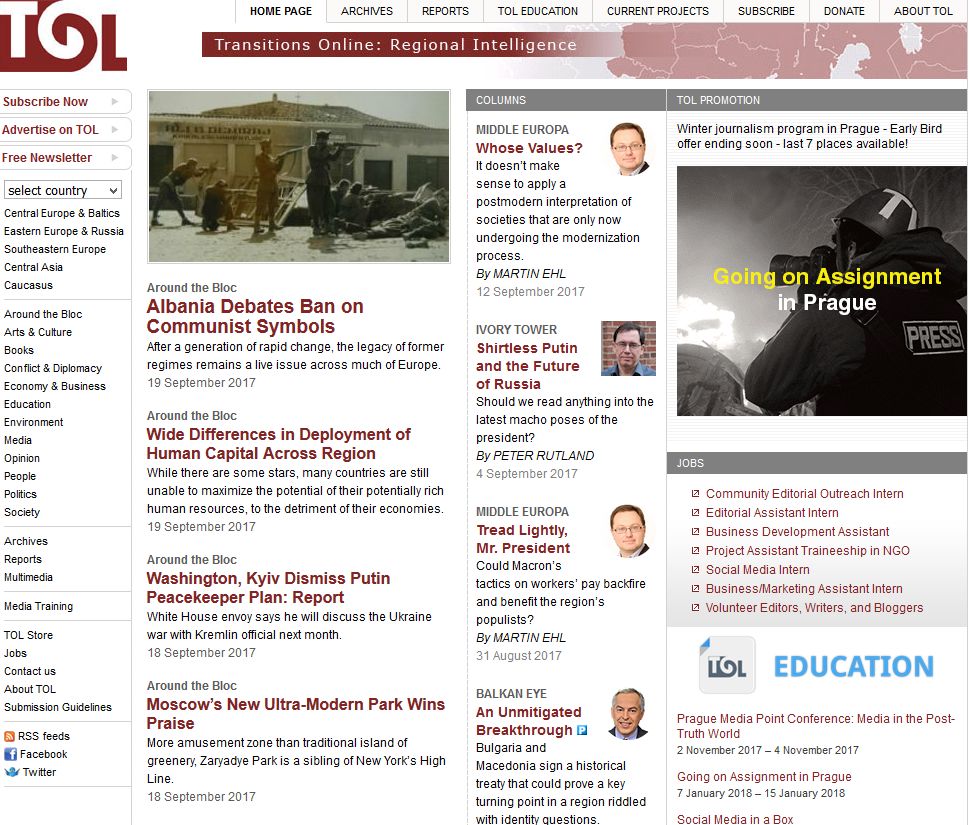
Transitions Online_Around the Bloc-U.S.-Balkans-Syria Arms Triangle Revealed
Syria; arms; US; Pentagon; Balkans; East; Europe
More...We kindly inform you that, as long as the subject affiliation of our 300.000+ articles is in progress, you might get unsufficient or no results on your third level or second level search. In this case, please broaden your search criteria.

Syria; arms; US; Pentagon; Balkans; East; Europe
More...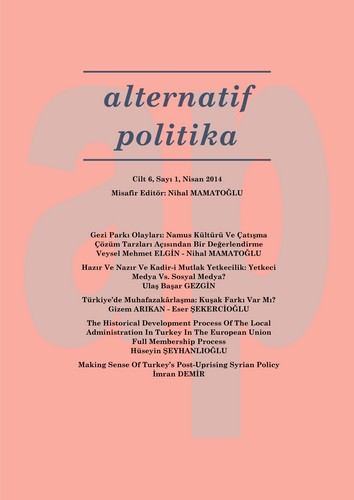
The aim of this study is examining the perception of Gezi Park Events, which have emerged late May 2013, on its first 15 days by university students mainly within the framework of honor culture and conflict resolution styles. For this purpose, three focus group studies conducted on 7th and 12th June of 2013 by the participation of Abant Izzet Baysal University were analyzed. In this study, the emergence and the development of Gezi Park Events were examined by mutual and dynamic perspective from the angles of both protestors and the authorities (i.e., law-enforcement officers, government officials). Focus group data revealed that focus group participants’ interpretations about the attitude and behaviors of the protestors and authorities are in line with the expectations of the honor culture. To exemplify, focus group participants claimed that protestors may have perceived the authorities’ expressions and behaviors towards themselves as insult (i.e., humiliation); which in turn, this perception may have resulted in the occurrence of emotional (e.g., anger) and behavioral (e.g., protests, marching) reactions. Similarly, it was claimed that also authorities may have perceived the protests and protestors’ attitudes and behaviors as insults towards themselves and their power; which in turn, authorities may have seen any kind of stepping back as a sign of weakness. Accordingly, it can be claimed that focus group participants perceived the development of Gezi Park Events from a dynamic perspective where the protestors’ and the authorities’ acts activate each other’s acts. In addition to this, from the perspective of conflict resolution styles, the issues of the both parties’ not-stepping back, mutual verbal and physical violent acts indicate the usage of competing conflict resolution style in general. In this perspective, it is discussed that competing conflict resolution style comes up as a function and the result of honor culture, and the study provides a theoretical perspective on the relationships between honor culture and conflict resolution styles.
More...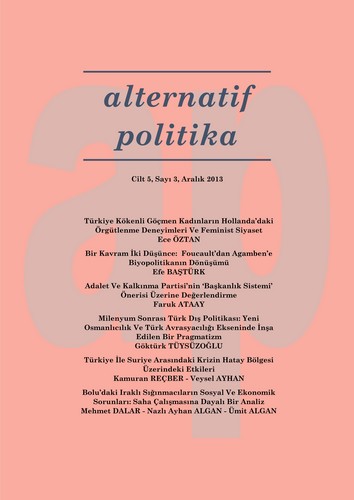
An anti-regime demonstration in Syria started on 2011 March deeply impacted upon the unity of the country. Ankara’s perception identifying domestic problems in Syria with Turkey’s economic and political instability stems from the historical, economical, ethnical, sectional similarities within the two countries. The drastic dissolution of Syria due to the internal war occurring in the country directly impacts the stability of Turkey in different ways. The economic sanctions on Syria affects Hatay’s economy dreadfully. In this context, the study evaluates how the effects of the sanctions on Syria impact Hatay region politically and economically and the demands of the people in Hatay dreadfully affected from this crisis . It needs to be noted that there has always been a commercial and social relationship between Hatay region and Syria in the history.
More...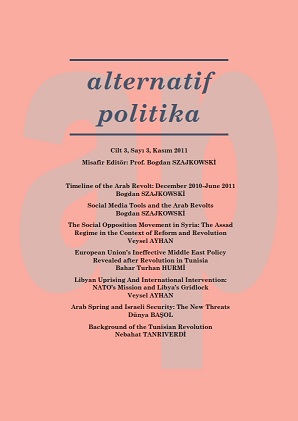
This paper analyses the successes as well as shortcomings of European Union‟s policies in the Middle East region, and in Tunisia in particular with special reference to the effectiveness of these policies in tackling the problems of this area. The paper also makes recommendations and suggestions for the development and adoption by the EU of foreign policy prescriptions for increased stability, democracy and peaceful evolution of the region. It that Europe needs to behave more like a regional power and less like a big NGO in its dealings with post revolutionary Tunisia, asserting its own vision of how it would like to see the new polity develop and behave.
More...
Although neither NATO’s documents nor the UN Security Council resolution in 1973 legitimizing the use of force allow for the direct overthrow of Gaddafi, some NATO member Heads of States have stated that the goal of the Libyan operation was clearly explained as overthrowing Qaddafi. As such, the NATO member states clearly have different policies in the Libyan crisis, despite the fact that NATO overtook command of the Libyan mission. In addition, on June 5, 2011, it was understood that—in military terms—neither the opponents nor Gaddafi's forces had enough power to take control Libya, which resulted in the subsequent NATO strategies to gain considerable importance.
More...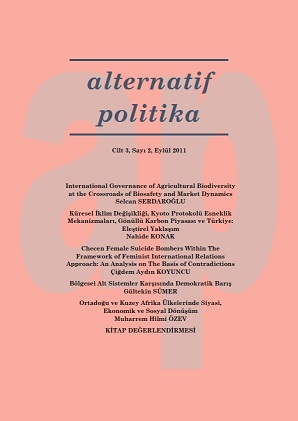
Whereas Europe occupies a significant position regarding the theory of democratic peace, it would be misleading to regard her as the sole regional subsystem on which theory of democratic peace would be based. For the reality of democratic peace in the Western world cannot be understood without the dynamics peculiar to Europe. The existence of independent units competing with each other for power and influence has given the Continent its very characteristic. Thus, foreign policies of the states have not risen over democratic peace, but rather democracies were born into the nation-states in quest for furthering their interests. Unprecedented technological achievements increased the destructive capacity of the subsystem whose consequences favored the emergence of an international society in Europe. The emergence of a pluralistic security community entailing the sense of common “we” - embodied in the example of European Union- amounted to permanent peace in Europe. Thus, it is significant to regard democratic peace as a sub-system phenomenon rather than a dyadic one. Due to this very reason, possible democratizations in non-western subsystems will signify a sounder testing of the theory since democratic peace is open to more vulnerability in such subsystems. Given the limited amount of cases to be handled, the conclusions reached by the advocates of democratic peace are not strong enough to support the democratic peace theory. The strength of democratic peace is to be clarified inasmuch as democratic dyads are subjected to external dynamics tough enough to compel democracies to step back from their democratic identities. Since war proneness is directly related to the very characteristics of each subsystem, total elimination of war might only be possible with the formation of pluralistic security communities. Otherwise, such political geographies may easily succumb to constructive structures that can bring about outbreak of wars.
More...
2004 tragedy opened fault lines between the government and critics of its shoot-to-kill approach to terror incidents.
More...
War games come hard on the heels of Russian-led maneuvers in neighboring Belarus.
More...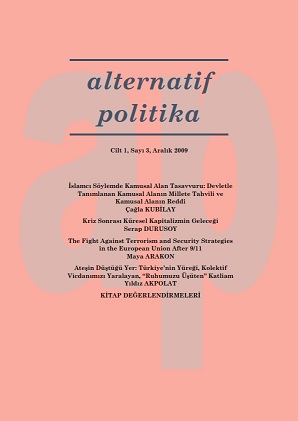
This report evaluates socio-economic and socio political patterns of the murder resulting the death of 44 people, happened in Bilge Village, Mardin, a city locating in the South Eastern Part of Turkey. In this context , the researcher carried out surveys and semi-structured interviews in Bilge Village in order to understand the patriarchal and feudal structure of the brutality.
More...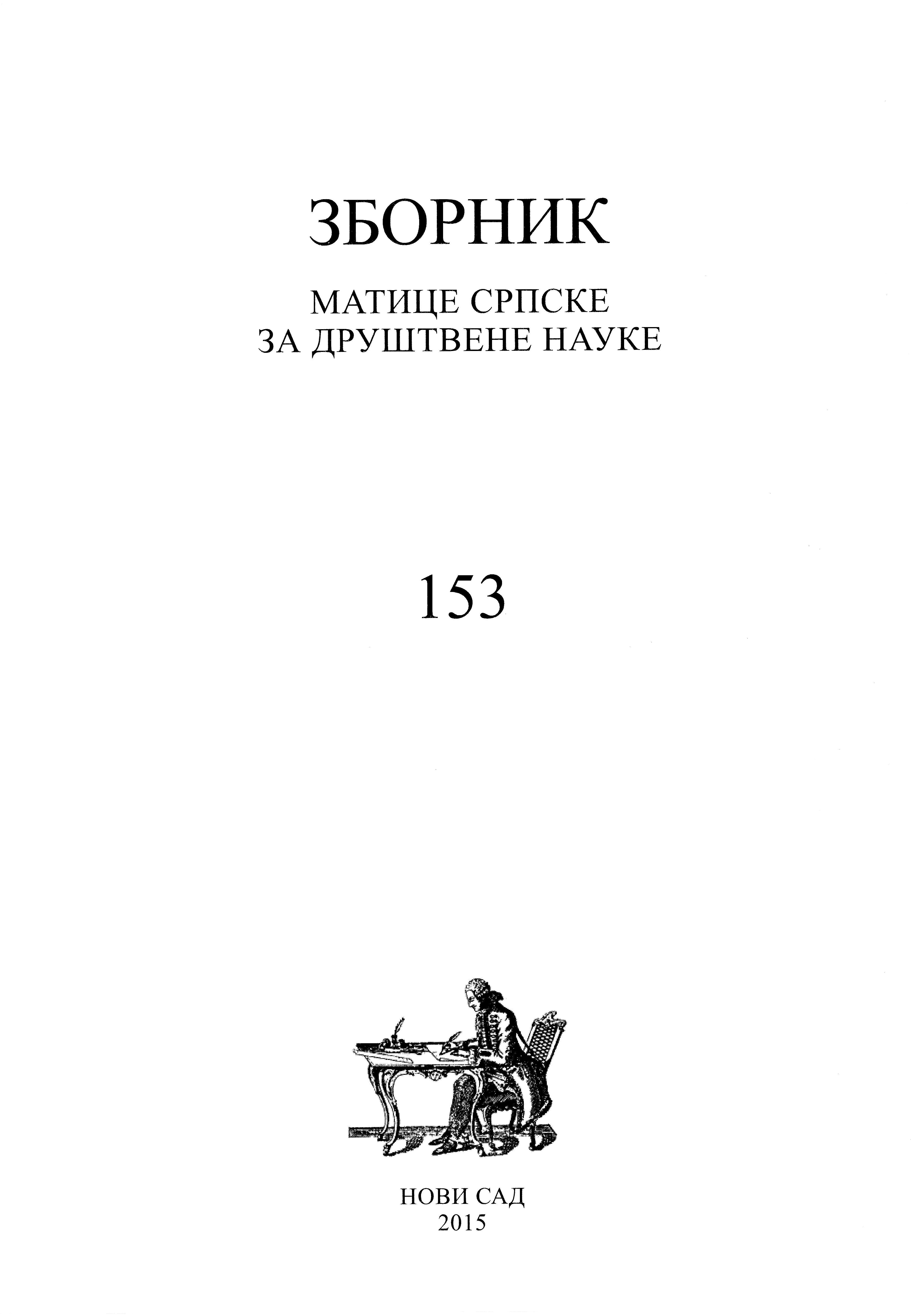
Before the arise of the world economic crisis, contemporary concepts of World State creation had been based mainly on political and military-security reasons of global integration. They all emerged from “Peace plans” of confederate consociation of national states primarily into the peace, and, then, supranational political organizations. All of the modern plans of World State that had originated in the “Peace politics” of modern era were based on political and security arguments and offered political and institutional solutions, while their contemporary followers operated these ideas theoretically only in much different current circumstances. Only after the crisis had erupted, did new ideas and new concepts of the World State supporters emerge, suggesting how to handle the consequences of the crisis. As some national states have demonstrated incapacity to deal with it, new reasons for “necessary” global institutional superstructure have appeared. The most important opinion on this matter was given by Jacques Attali, well known French economist, writer and high public official. This paper gives Attali’s philosophical and historical overview on world crisis as the first financial crisis of mondialization. Attali explains the inevitable historical pattern that anarchic mondialization has led to, which, he presumes, requires establishment on global level, what was previously done on the national level. Furthermore, he gives the description of a possible World State as a presumed result of balance between market and democratic forces that will lead into the establishment of new institutions on the basis of those already existing, global international organizations. All of these presumptions are exposed to criticism in the final section of the paper.
More...
The Serbian-Bulgarian relations, which were often marked by political and diplomatic conflicts and wars, culminated in the World War I. After the war, the Bulgarians became deeply rooted in the collective memory of the Serbs as an “arch-enemy” and the most hated nation. This could also be seen in the way the common recent past was interpreted. The aim of this paper is to show the ways the publicly and officially treasured memory of the recent past of Serbian-Bulgarian relations can be used politically, and the way the war sufferings and calamities, historical dates and events, were used in the internal political and ideological discourse.
More...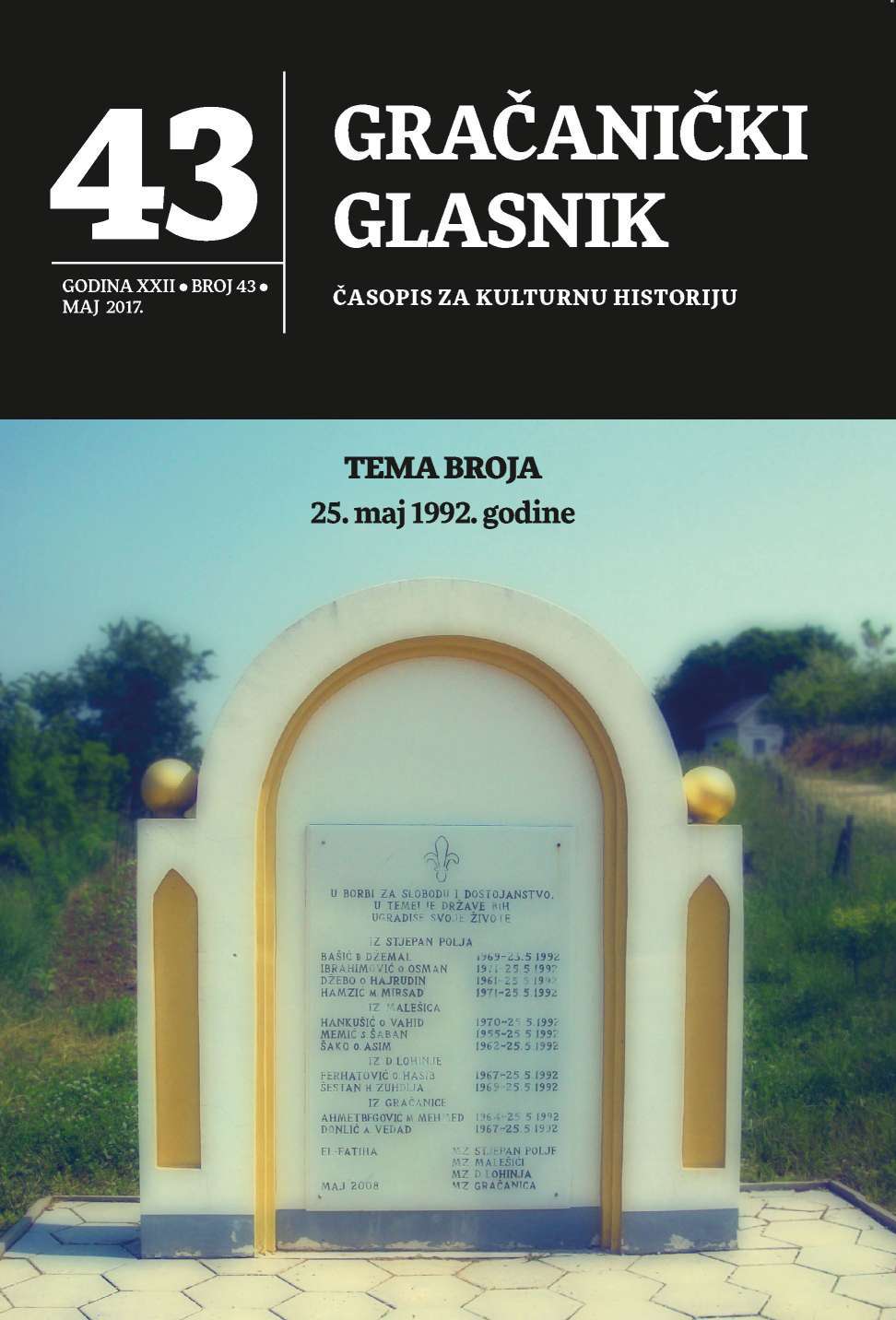
This paper deals with the beginning of the war, that is the outbreak of hostilities in the territory of the municipality of Gracanica, with the details of the so-called The May Storm Over Gracanica (from 18th to 25th May, 1992) when the Chetniks from Ozren, on 25th May, 1992 performed the hardest granading over Gracanica, attepmting the infantry attack on the town that got in their way of realization of the famous plan of the occupation of the region of Tuzla codenamed Drina, for the first time. According to that plan, among other things, the municipality of Gracanica was to be cut by the Chetnik movement forces from Ozren, connecting Kakmuz on Ozren side and Lohinje (Serbian settlements) on Gracanica side, farther to Smoluca and Jasenica on the road Tuzla–Srebrenik. Another offensive line led from Karanovac on Ozren side, connecting with Lendic in the municipality of Gracanica and further by the direction of Skipovac – Duga Njiva on Trebava. In this direction, the specifically fortified Lendići were of great strategic importance, from which provocations and artillery strikes on Gracanica and neighboring Bosniak villages were very frequent during this period. In an attempt to eliminate the danger from this stronghold, the defenders of Gracanica, on 23th and 25th May carried out an attack on the most prominent Chetnik positions towards the village Malesici in the region of Ahmici and on the established ground level of Zecev Gaj within the reach of Lendic. Taking the positions in Ahmici on 23th May, the members of the Territorial Defense of Malesići and Stjepan Polje, supported by the volunteers from the Emergency Unit of the BPDA, tried two days later to take even the ground level of Zecev Gaj. Because of the obvious flaws in the organization of the attacks, insufficient safety precautions and inexperience, they suffered heavy losses, losing 10 young soldiers in just one day, after which all the actions in that area were suspended. The author describes in detail a series of armed provocations by the Chetniks from Ozren toward Gracanica and other settlements on the right side of Spreca, which preceded the decisive blows, on 25th May, 1992. At the same time, he points out the certain weaknesses in the organization of the defense of Gracanica, which had just escalated in the mentioned period as a result of political animosities in the military-political leadership of the municipality, and if these hadn’t been overcome, they could have caused even worse consequences.
More...
Unfortunately, the question arising from the title of this work is not precisely and clearly answered to this day, despite various interpretations and perspectives of one and the same event, both by the direct participants, as well as by those who have tried to produce some objective historical picture on the basis of relevant evidences. Among other things, it gave rise to a variety of mystification and speculation, as well as various misuses of people’s memory, which in the least do not deserve this event by itself. The author of this work has not even attempted to answer this question, the question is rightly and properly set with an aim to encourage some new serious research. For the beginning, he offered some testimonies of participants almost from the scene, which he annotated immediately after this battle, as a contribution to the study of the decisive events from the Defensive-Liberation War in the region of the municipality of Gracanica.
More...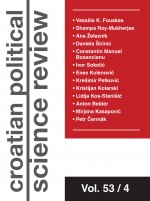
Turkey is the only Eurasian state nearly surrounded by a circle of acute hot and “frozen conflicts”, ranging from low-intensity violence through terrorism to full-fledged wars. The prevailing pattern of inter-communal and interethnic conflicts in the Balkans and on Cyprus has long been different from the patterns of conflict in the rest of Europe and in the Near East. This difference is closely related to the fact that these lands experienced in the past a centuries-long rule by the Ottoman Empire, whose legal successor is the Republic of Turkey. The inter-communal conflict potential in the rest of Europe used to differ substantially from the one in the Balkans, but the difference has been greatly reduced as Western Europe has in one respect become “balkanised”.
More...
Dora Komnenović - Catherine Baker The Yugoslav Wars of the 1990s Palgrave Macmillan, London, 2015, 181 pp. Amar Rešić - Soeren Keil and Bernhard Stahl (editors) The Foreign Policies of Post-Yugoslav States: From Yugoslavia to Europe Palgrave Macmillan, Basingstoke, 2014, XVII + 259 pp. Leon Cvrtila - Jardar Østbø The New Third Rome: Readings of a Russian Nationalist Myth ibidem-Verlag, Stuttgart, 2015, 308 pp.
More...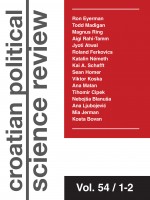
This article focuses on the research of Stalinist repression in Estonia, observing the work done within the past 25 years. Understandably, many studies have concentrated on victims and repressive institutions. The public concern for the topics in the 1990s has considerably declined in recent years. Although by today we have an excellent overview of committed acts of violence, there are numerous aspects that require in-depth research. It is necessary to notice not only the victims and perpetrators, but also common citizens’ forms of action both in crucial and everyday situations. The engagement of fellow-citizens in various punishment operations, staging “guilt” and confrontation, and other similar maneuvers caused tensions in the population and as such facilitated the established control over society. Mapping various measures taken by the state and the experiences gained by different social groups is an essential stage in interpretation of tough times. This work needs to be continued.
More...
After Edward Snowden’s leaks revealed to the public in June 2013, mass surveillance programs still exist. Considering that these practises restrain the right to privacy, there is a need to rethink the very concept of mass surveillance. The aim of this paper is to analyse this concept, sum up the problems related to its logic and methods, and question its legitimacy. Critical approach to the concept of mass surveillance is necessary on order to create the basis for resolving current issues related to it. My research shows that there are reasons to question legitimacy of mass surveillance as it not only breaches the right to privacy but also ignores the presumption of innocence and there is possibly a substantial lack of oversight by the independent bodies which is necessary to make these practices democratic. Moreover, given that mass surveillance programs were introduced to fight terrorism and crime, it should be assessed how efficient they really are and whether they are worth having considering their drawbacks and potential dangers for the society
More...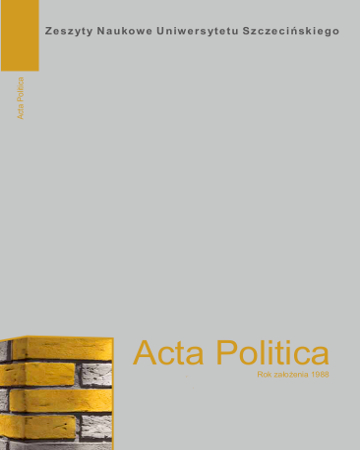
In der Zeit des kalten Krieges funktionierte die europäische Sicherheit hauptsächlich als Relation zwischen der UdSSR und USA und stützte sich auf dem Gleichgewicht der Kräfte zwischen dem Osten und dem Westen. Die Teilung Europas in zwei gegensätzliche politisch-militärische Blocks unermöglichte die Gründung des allgemeineuropäischen Sicherheitssystem. Infolge dessen bildeten sich in Europa zwei voneinander unabhängige Gemeinschaftssicherheitssysteme, von denen der Schutz gegenseitigen Grundwertekataloge akzeptiert wurde. Die Beziehungen zwischen den beiden Sicherheitssystemen wurden auf der gegenseitigen Abschrecken aufgebaut, die man als Folge des Rüstungsweltlauf und dem Streben nach Erhaltung des Kräftegleichgewichts bezeichnen kann.
More...
Among the various other means of peaceful settlement of international disputes special place belongs to the settlement of disputes by international organizations and their organs. In the first part of the work the author briefly deals with international disputes, the obligation to resolve them exclusively by peaceful and the general role of international organizations in all of this. The second part of the paper contains short presentation of disputes settlement before the United Nations, including International Court of Justice, Security Council, General Assembly. The third part is dedicated to resolving disputes under the auspices of other universal international organizations (UN specialized agencies, IAEA, WTO, OPCW), the fourth deals with the settlement of disputes by the regional organizations, and the fifth refers to international bodies which are not international organizations (in particular, the International Criminal Court). In his final remarks the author concludes that there are more and more international organizations, that there the mechanisms for resolving disputes within are more and more diverse and more efficient, but that in some cases the practice continues to fail. When it comes to political disputes, in matters where competing interests collide, disputes still often tend to be tackled in the open or hidden use of force, although this is prohibited by international law. This is especially true in cases involving some of the great powers.
More...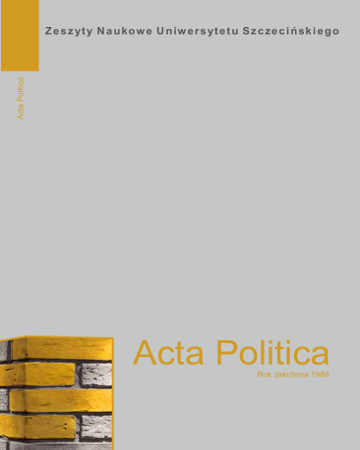
The aim of this paper is to present the set of priorities of the Norwegian policy with reference to NATO evolution before and during Alliance Summit in Riga. The article should point out the background for Norway’s approach towards transformation of NATO. Is it in the best interest of Norway to support and contribute to the NATO’s development at the beginning of XXI century? The Norwegian strategy towards NATO is an expression of national political and military aspirations, so, the motives of the Norway to create new shape of Alliance military cooperation must be touched upon. The fact that Norway is so firmly anchored in NATO’s structures constitutes an important factor for state’s security policy – strategy. As a result Norwegian activity in the field of security must be seen as an element many-sided NATO transformation.
More...